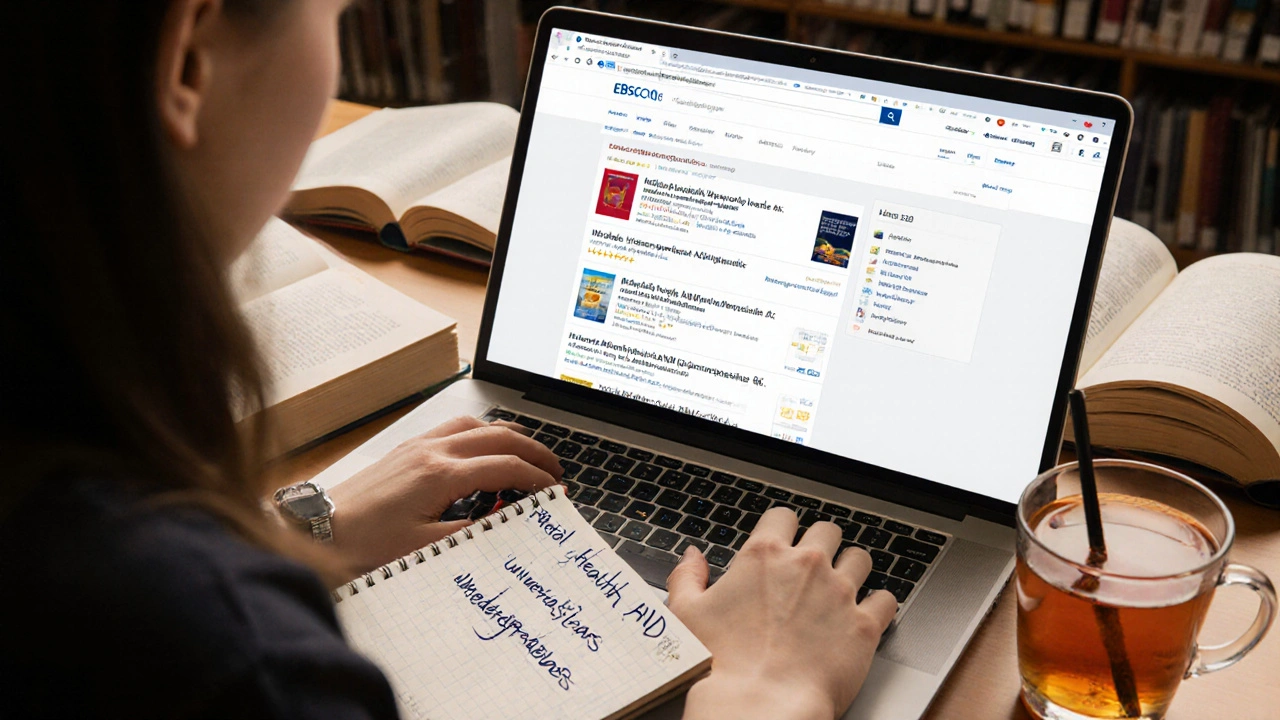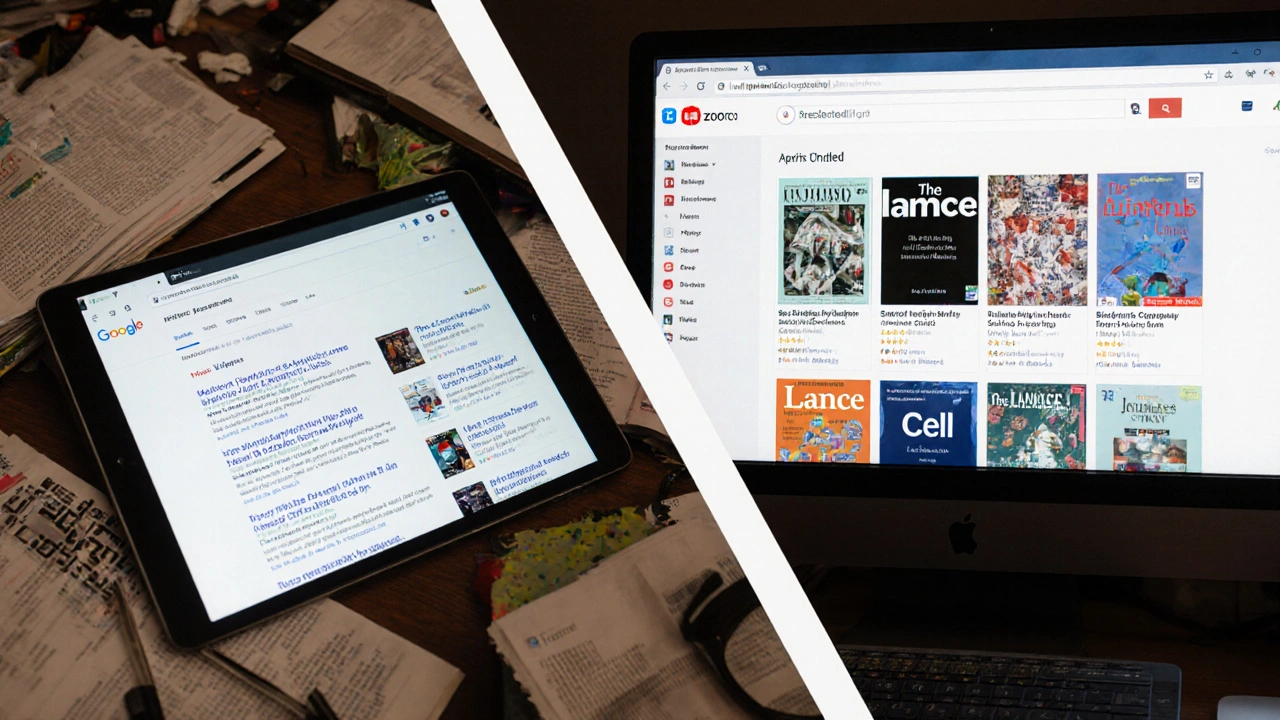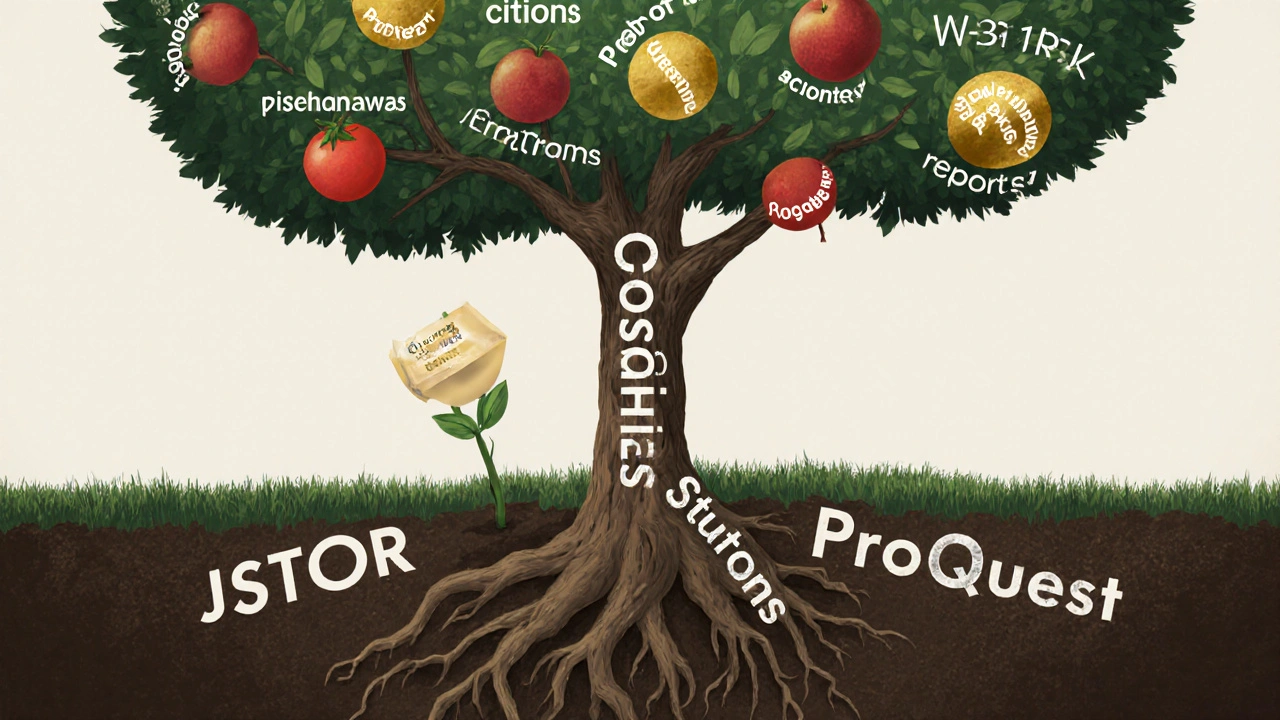
If you're writing an essay for a UK university, your grade often depends on one thing: the quality of your sources. Professors don’t just want your opinion-they want evidence. And that evidence has to come from credible, peer-reviewed academic articles. But finding those articles isn’t as simple as typing a topic into Google. Many students waste hours scrolling through unreliable websites, only to end up with outdated or irrelevant material. The good news? With the right databases and search strategies, you can find high-quality sources fast.
Why Google Won’t Cut It for UK Essays
Google Scholar looks helpful, but it’s not enough. It pulls in everything-blogs, conference papers, theses, and even self-published content. A 2023 study by the UK Higher Education Academy found that 68% of undergraduate submissions using only Google Scholar contained at least one source that was not peer-reviewed. That’s a major red flag for markers.
UK universities expect you to use academic databases. These are curated collections of journals that have been vetted by experts. They filter out opinion pieces, news articles, and low-quality content. If your essay references only Google results, your marker will assume you haven’t done the work.
Essential Databases for UK Students
Most UK universities give you free access to these key databases through their library portals:
- JSTOR - Covers humanities, social sciences, and some sciences. Contains full-text archives of journals going back over 100 years. Great for historical context or classic theories.
- EBSCOhost (including Academic Search Complete and PsycINFO) - One of the most used platforms. Includes thousands of peer-reviewed journals across disciplines. PsycINFO is essential for psychology, education, and sociology essays.
- ScienceDirect - Best for STEM fields. Hosts journals from Elsevier, including top titles like The Lancet and Cell. If you’re writing about medicine, engineering, or biology, this is your go-to.
- ProQuest - Strong in social sciences, law, and education. Includes dissertations and theses, which are often overlooked but can be goldmines for original research.
- Web of Science - Tracks citations. If you find one strong article, you can see who cited it later (forward citation) and who it cited before (backward citation). Perfect for mapping academic conversations.
Don’t just pick one. Use at least two. Each database has different coverage. For example, JSTOR might have a 1992 article on postcolonial theory, but ScienceDirect won’t. ProQuest might have a recent PhD thesis on student mental health that no other database holds.
How to Search Like a Pro
Typing “climate change effects” into a database will give you 5,000 results-most of them useless. Here’s how to narrow it down:
- Use quotation marks for exact phrases: “climate change effects on agriculture” finds only articles using that exact wording.
- Use Boolean operators: Combine terms with AND, OR, NOT. For example: “mental health” AND university AND undergraduates. This cuts out irrelevant results like studies on workplace stress.
- Filter by date: Set a range. For most essays, focus on the last 10 years. If you’re studying theory or history, go back further-but always explain why.
- Filter by peer-reviewed: Almost all databases have this toggle. Turn it on. Always.
- Use subject headings: Databases like EBSCO and ProQuest assign standardized keywords to articles. Click on one of these in a relevant result-it will pull up all other articles tagged the same way.
Pro tip: If you find one great article, look at its reference list. That’s a shortcut to other high-quality sources. This is called snowballing, and it’s a technique used by PhD students.

What Counts as a ‘Good’ Academic Article?
Not every article you find is worth using. Here’s how to spot the good ones:
- Author credentials: Look for authors affiliated with universities or research institutes. Avoid authors with no institutional link.
- Journal reputation: Is the journal indexed in Scopus or Web of Science? If yes, it’s likely reputable. Avoid journals with names like “International Journal of Advanced Studies in Everything.”
- Structure: Good articles have clear sections: Abstract, Introduction, Methodology, Results, Discussion, References. If it reads like a blog post, skip it.
- Citations: A strong article cites at least 15-20 sources. If it references mostly websites or books from 1980, it’s probably outdated or shallow.
One student I worked with last year found an article titled “Why Social Media Destroys Teenagers.” It had 200,000 views online. But when she checked the journal, it was self-published by a non-academic blog. She deleted it. Her essay got a first-class mark.
Accessing Articles When You’re Off Campus
Your university login works from anywhere. Log in to your library portal using your student ID. Most databases let you access full texts remotely. If you’re stuck, try these:
- Use your university’s proxy server. It’s usually listed on the library homepage.
- Search for the article title + “PDF” in Google. Sometimes authors post free versions on their personal or institutional websites.
- Use Unpaywall (a free browser extension). It finds legal open-access versions of paywalled articles.
Never use Sci-Hub. It’s illegal in the UK and puts your university at risk. Plus, the files are often corrupted or missing pages.

Organizing Your Sources
You’ll find 20-30 useful articles for a 3,000-word essay. Don’t just download them into a messy folder. Use a reference manager:
- Zotero - Free, easy to use, works with Word. Automatically generates citations in Harvard, APA, or OSCOLA styles.
- Mendeley - Also free. Good for PDF annotation and collaboration.
- EndNote - Used by many UK universities. More complex but powerful for large projects.
As you read each article, write a one-sentence summary in your reference manager. That way, when you start writing, you won’t waste time re-reading everything.
Common Mistakes to Avoid
Here’s what most students get wrong:
- Using Wikipedia as a source. It’s a starting point, not an ending point. Always trace the reference back to the original article.
- Quoting from abstracts only. Abstracts summarize, they don’t prove. Read the full paper.
- Using textbooks as primary sources. Textbooks are secondary-they explain ideas. Your essay needs the original research behind those ideas.
- Ignoring UK-specific studies. If your essay is about education policy, use articles from the UK government, the Office for Students, or the Education Policy Institute-not just US journals.
One student submitted an essay on mental health services for students. She used five American studies and one UK government report. Her marker wrote: “Where are the UK-specific findings?” She lost 15% of her grade.
Final Checklist Before You Submit
Before you hit send, run through this:
- Are all your sources peer-reviewed journal articles or official reports?
- Have you used at least 3 different databases?
- Are your citations formatted correctly for your course (Harvard, APA, OSCOLA)?
- Have you paraphrased properly and cited every idea that isn’t your own?
- Did you check that every link in your references works (if submitting online)?
Getting the right sources doesn’t guarantee a top mark-but using bad ones guarantees you won’t get one. Take the time to do it right. Your future self will thank you.
Can I use Google Scholar for UK essays?
You can use Google Scholar to find article titles, but don’t rely on it for sources. Many results are not peer-reviewed. Always check if the article is available through your university’s library databases like JSTOR or EBSCOhost. If it’s not, it’s likely not acceptable for academic essays.
How many sources do I need for a 3,000-word essay?
Aim for 15-20 high-quality sources. That’s about one source every 150-200 words. Quality matters more than quantity. Ten strong, well-used sources beat twenty weak ones.
What’s the difference between a journal article and a book chapter?
Journal articles are peer-reviewed, focused on recent research, and typically shorter (5,000-8,000 words). Book chapters are often broader, may not be peer-reviewed, and are usually written by experts summarizing existing knowledge. For essays, prioritize journal articles unless your tutor specifically asks for book chapters.
Can I use government reports as academic sources?
Yes, if they’re official and published by recognized institutions like the UK Parliament, the Office for National Statistics, the Department for Education, or the NHS. These are primary sources and highly valued in social science and policy essays.
How do I know if a journal is reputable?
Check if the journal is listed in the Directory of Open Access Journals (DOAJ) or indexed in Scopus/Web of Science. Avoid journals that send you spam emails asking you to pay to publish. Reputable journals don’t charge authors to submit-only open-access ones charge a fee after acceptance.